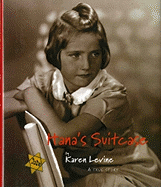Book Descriptions
for Hana's Suitcase by Karen Levine
From Cooperative Children's Book Center (CCBC)
Fumiko Ishioka was director of the recently established Tokyo Holocaust Center in 1998. The small museum’s aim was to teach Japanese children about the Nazi Holocaust. In response to Fumiko’s request for items to exhibit, the Center had received a small box of objects from Auschwitz that included a child’s suitcase. Scrawled on the suitcase was the name and birthdate of its owner: Hana Brady, born May 16, 1931, and the information that she was an orphan. The suitcase inspired the curiosity and compassion of Fumiko and the children to whom she showed it—they wanted to know more about this young girl. In alternating chapters, two stories unfold. One is tender and ultimately tragic, as it chronicles Hana’s early life with her parents and brother in Czechoslovakia and how she was eventually deported by the Nazi’s, first to Theresienstadt and finally to Auschwitz. The other is intriguing and ultimately extraordinary, as it follows the efforts of Fumiko over the course of two years to learn more about Hana, starting only with a name. The stories converge in a startling moment of revelation and its emotional aftermath when Fumiko finally learns that Hana died at Auschwitz, but her older brother, George, survived the Holocaust and is still alive. The letter that Fumiko wrote him introducing herself and all that she had learned, as well as the letter he wrote in reply, marked the end of Fumiko’s search. The following year George traveled to Tokyo, where he met Fumiko and the children in Small Wings, the peace group inspired by Fumiko—and Hana—to help teach other children in Japan about the Holocaust. Numerous childhood pictures of Hana Brady, as well as reproductions of some of the pictures she drew while in Theresienstadt, are included in this highly accessible and moving volume. (Ages 9–14)
CCBC Choices 2004 . © Cooperative Children's Book Center, Univ. of Wisconsin - Madison, 2004. Used with permission.
From the Publisher
This award-winning true Holocaust story, newly updated, connects generations through one woman’s quest to find the truth behind a mysterious suitcase.
In March 2000, Fumiko Ishioka, the curator of a small Holocaust education center in Tokyo, received an empty suitcase from the museum at Auschwitz. On the outside, in white paint, were the words “Hana Brady, May 16, 1931, Orphan.”
Fumiko and the children at the center were determined to find out who Hana was and what happened to her all those years ago, leading them to a startling and emotional discovery.
The dual narrative intertwines Fumiko’s international journey to find the truth about Hana Brady’s fate with Hana’s own compelling story of her life in a quiet Czech town, which is shattered by the arrival of the Nazis, tearing apart the family she loves. This suspense-filled work of investigative nonfiction draws in young readers and makes them active participants in the search for Hana’s identity.
Praise for Hana’s Suitcase
• “Hana wanted to become a teacher, and surely through this little book her dream is being realized.” —Archbishop Desmond Tutu, from his new foreword to Hana’s Suitcase
• “The account . . . is part history, part suspenseful mystery . . . with an incredible climactic revelation.” —Booklist
In March 2000, Fumiko Ishioka, the curator of a small Holocaust education center in Tokyo, received an empty suitcase from the museum at Auschwitz. On the outside, in white paint, were the words “Hana Brady, May 16, 1931, Orphan.”
Fumiko and the children at the center were determined to find out who Hana was and what happened to her all those years ago, leading them to a startling and emotional discovery.
The dual narrative intertwines Fumiko’s international journey to find the truth about Hana Brady’s fate with Hana’s own compelling story of her life in a quiet Czech town, which is shattered by the arrival of the Nazis, tearing apart the family she loves. This suspense-filled work of investigative nonfiction draws in young readers and makes them active participants in the search for Hana’s identity.
Praise for Hana’s Suitcase
• “Hana wanted to become a teacher, and surely through this little book her dream is being realized.” —Archbishop Desmond Tutu, from his new foreword to Hana’s Suitcase
• “The account . . . is part history, part suspenseful mystery . . . with an incredible climactic revelation.” —Booklist
Publisher description retrieved from Google Books.


